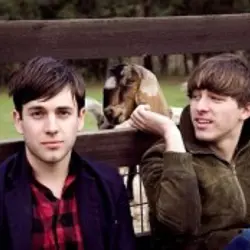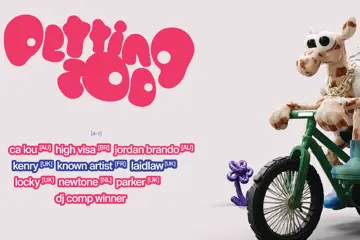 Oh Mercy
Oh MercyDeep Heat, Oh Mercy's third LP, is dark, danceable, and entirely fictional. This is quite a far cry from the largely acoustic confessional of Great Barrier Grief, the band's second LP – an album full of first person perspectives, with a keen focus on personal, single-subject sort of topics. On that album, most of the contents are love songs of some description: lovers leaving lovers, lovers missing lovers, lovers resisting relationships, running away, and so on. If there are songs about love on Deep Heat, however, it's probably been corrupted in some way. In place of yearning and apologies, there's sexual deviancy, possession, manipulation and lust. In place of the boy next door, the average middle-class lover, there's the devil and the grim reaper.
The shift was born out of frustration. People were beginning to put frontman Alex Gow and his band into a box, and this did not make Gow very happy. “Initially, it was the idea that I'm not comfortable with being defined in any way, personally or musically. And people had started to make fairly lazy kind of generalisations about the kind of guy I was and the way that I make music. So I wanted it to make it quite clear that I won't be pigeon-holed and I had to throw people a bit of a curve ball with this album.”
So he did. Lyrically, musically, Deep Heat could be by a different band. The usual set-up of guitar, drums and bass have been joined by keyboard, organ, flute, and a fleet of saxophones. Acoustic has gone electric and the genres on this album swing from funk to reggae. “I've always been interested in groove-based music and '70s R&B and some glam rock kind of stuff,” Gow says. “I'm always the guy with the iPod, kind of DJing and trying to make everyone dance. So I figured I'd make a danceable kind of record. And try to marry it with considered lyrics… often with those types of songs that I'd play, the lyrics would be fairly throw-away and a bit of an afterthought.”
This time, though, lyrics are at the forefront. After reading Paul Kelly's memoir, Gow wanted to start telling stories. So he wrote My Man, a song from the perspective of a deeply possessive woman, and the rest of the album followed on from there. In the end, there was a work of fiction: ten short stories in song form, with a focus on dark people in dark places. “I'm not writing about my fairly mundane, middle-class existence,” Gow says, insisting that the transition from writing autobiography to writing fiction was actually not a difficult one to make at all. “I have a wider pallet of vocabulary and concepts to choose from and exploit, which makes writing a lot easier.”
Don't miss a beat with our FREE daily newsletter
It's a pallet that consists of the world around him. He gets his ideas by paying attention: to books he's reading, movies he's watched, to things that people say. “Just fairly kinda human stuff, you know. If you're not like a hermit, you know… I have an interest, as lots of people do, in the human condition and the way that we operate and the things that we do. And, yeah, I suppose I read a fair bit and take a fair bit of inspiration out of books.”
The band is home in Melbourne now, and have been for a little over a month, preparing for a Australian tour to promote the new album. A good chunk of the year, however, was spent overseas, basking in the North American spring and summer and touring extensively. Instead of flying between gigs, the members of Oh Mercy drove, clocking up a total of 13,450km in a tour van across Canada and the US. “I could talk all day about it,” Gow says when asked about his impressions of that great and strange land to the North.
“I suppose if there was one thing worthy of conversation, it would just be the great expanse of it, you know, and how dwarfing the whole country is. It's inspiring in its own way, because with that feeling of insignificance comes a certain creative lucidity. Other people deal with insignificance in a different way. It scares some people. But to some, including myself, it's incredibly inspiring. If I had to pick one thing, that was probably the most influential part of the trip.”
The discrepancies of the place didn't escape him either. “Socially the poles are so far apart. In terms of comfort that people are living with, the poles are miles apart. It's equal part depressing and inspiring,” he says, “but that's life.”
After the tour, the band joined up with producer Burke Reid and retired up to a studio near Portland, Oregon, to settle down for a bit and record the album. By then, Gow knew exactly the sort of album he wanted to make. “I had preconceived ideas about the aesthetic of the record and how it was going to go, and ways to go about making it. I wrote like a long mission statement a few months before we recorded about how it was gonna go and how we were going to record it and I sent it to Burke and he really understood where I was coming from, so yeah, I had concrete and sophisticated ideas about what kind of record I wanted to make.”
The studio was Family Farm Studios, a place just outside the city that encourages artists to stay a while, camp out, and take their time recording and creating, rather than rushing through the process in a few long, intense sessions. The members of Oh Mercy heard about the studio through friends and in that way arrived at the decision to record there. “We were touring around America prior to that,” Gow recalls. “We ended up in LA and some friends there had friends that owned the studio up in Portland. So with that in mind we were able to spend a couple more weeks at that studio that we would at any other studio and I knew that the time would be useful because I wanted to have as much time to explore different kind of sonic pallets, as opposed to being pressured to finish all the songs in a certain time.”
Still, even with mates rates, recording is not the cheapest of undertakings. “We got a slightly cheaper rate than the next guy, but, you know, that stuff's enormously expensive and that's where all your money goes into. And that's why it's not glamorous being a musician in Australia or probably anywhere. But I do better than most. We're lucky as it is to be able to record at all, anywhere. So I'm grateful for that.”
From there, they didn't do much but record for the next month and a bit, not even leaving the studio, to explore the city a few kilometres away. “We were recording every day, basically, so we could've been anywhere in the world,” says Gow. “Apparently Portland's nice. I couldn't tell you.”
Their Australian tour kicks off in Brisbane towards the end of September and covers a good portion of the country, wrapping up somewhere towards the end of October. No strangers to the touring routine, Oh Mercy have been around the country a few times now, so many Gow's lost track. “Dunno. More than 10 less than 20,” he guesses. He says they've come get to know all sorts of people on these tours, and that's the part he really enjoys. “That's one of my favourite things about touring – the friends that we've made, whether it be fans or people in the profession, it's probably my favourite thing about touring.” And with any luck, this time he'll have them up and dancing as well.
REID HEAT
The recording of Deep Heat was an experience in itself. The band spent over a month holed up in the studio with producer Burke Reid, who really pushed them and kept energy levels high. “He's a lovely guy,” Gow says of Reid. “He's got a lot of nervous energy, which you see a lot in producers. So he's got energy to burn.”
Reid is originally from Canada but he moved to Australia in his teens, and had joined the Sydney trio Gerling by the late '90s. Since then, he's produced for the Drones and Garreth Liddiard, The Mess Hall, Jack Ladder and Liam Finn, among others, and has mixed or engineered for many more. “He can work 10 hours a day,” Gow says. “And he's a bit of a renaissance man. Like, he can do the ProTools thing, but he can set up mics and he can, you know, understand tonality and chord structures and things like that.”
Gow had a very clear idea of the sort of album he wanted to make, well before the band even got into the studio, so Reid proved a fortuitous choice. He liked Reid because Reid facilitated, as best he could, the album Gow wanted to make. “Burke, he's a fairly ego-less producer,” says Gow. “He doesn't come in and try to call the shots. He makes the record the bands want to make.”
Plus, after so many months charging around North America, Reid actually got their jokes. “He grew up mostly in Australia so he has a similar sense of humour to the rest of us,” Gow explains. “It was a breath of fresh air.”
Oh Mercy will be playing the following shows:
Thursday 27 September – Cambridge, Newcastle NSW
Friday 28 September – ANU Bar, Canberra ACT
Saturday 29 September – The Standard, Sydney NSW
Sunday 30 September – Clarendon Hotel, Katoomba NSW
Thursday 4 October, Settlers Tavern, Margaret River WA
Friday 5 October – Norfolk Hotel, Fremantle WA
Saturday 6 October – Bakery Artrage, Perth WA
Thursday 11 October – The Gov, Adelaide SA
Saturday 13 October – Karova Lounge, Ballarat VIC
Thursday 18 October – Republic Hotel, Hobart TAS
Friday 19 October – Bended Elbow, Geelong VIC
Thursday 25 October – The Hi Fi, Melbourne VIC
Saturday 27 October – Railway Club, Darwin NT















